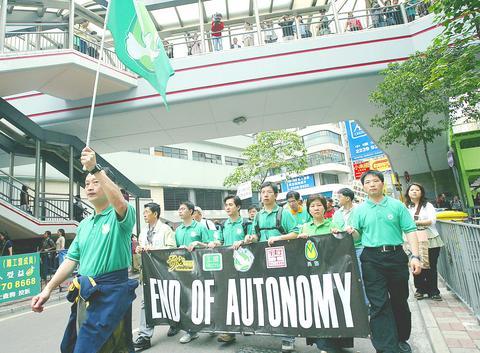Pro-democracy activists marched to China's representative office in the territory yesterday, demanding universal suffrage and accusing Hong Kong's leader of blocking reform.
"Hong Kong is ready and mature enough for direct elections," said Clare Lee, a 29-year-old organizer with the opposition Democratic Party.

PHOTO: REUTERS
Hong Kong's mini-constitution, the Basic Law, holds out the possibility that ordinary residents can elect their next leader in 2007 and all lawmakers by 2008.
But the protesters fear Beijing won't let that happen, and they accuse unpopular Chief Executive Tung Chee-hwa (董建華) of blindly backing the central government and thwarting the will of the people.
"He's killing the rights the Hong Kong people should have," said Tam Wai-to, a 44-year-old union leader.
Rally organizers said 200 people joined yesterday's march that started at Hong Kong government headquarters and then headed to the Chinese government's liaison office in the afternoon. Police declined to provide a crowd estimate.
"Fight for democracy," the protesters chanted.
Although Hong Kong people are clamoring for full democracy, Beijing and Tung have indicated they want any progress to come gradually. Critics call that a stalling tactic.
China's most powerful legislative panel, the Standing Committee of the National People's Congress, ruled earlier this month that Beijing would have to give advance approval for any political changes.
The committee is expected to issue another decision on Monday that critics fear will rule out direct elections for Tung's successor in 2007. Tung was chosen by an 800-strong committee that sides with Beijing.
Tung has weighed in by recommending that Hong Kong change its electoral policies. But he suggested a stringent list of conditions -- including taking Beijing's views into consideration -- that critics say will effectively stop the push for full democracy.
Ordinary citizens get to directly elect some lawmakers, however, and the number rises to 30 out of 60 this September, up from just 24 in the 2000 elections.
A pro-democracy lawmaker said yesterday that Hong Kong's government believes the possibility of direct elections in 2007 and 2008 will be ruled out by Beijing today.
The lawmaker spoke only on condition of anonymity and declined to identify the government official who made that prediction.
Tsang Hin-chi (曾憲梓), a Hong Kong resident and member of the Chinese legislative panel, defended Tung's suggestions on reform. Speaking in Beijing, he said yesterday that Tung's views were based on public consultations in Hong Kong.

A fire caused by a burst gas pipe yesterday spread to several homes and sent a fireball soaring into the sky outside Malaysia’s largest city, injuring more than 100 people. The towering inferno near a gas station in Putra Heights outside Kuala Lumpur was visible for kilometers and lasted for several hours. It happened during a public holiday as Muslims, who are the majority in Malaysia, celebrate the second day of Eid al-Fitr. National oil company Petronas said the fire started at one of its gas pipelines at 8:10am and the affected pipeline was later isolated. Disaster management officials said shutting the

US Vice President J.D. Vance on Friday accused Denmark of not having done enough to protect Greenland, when he visited the strategically placed and resource-rich Danish territory coveted by US President Donald Trump. Vance made his comment during a trip to the Pituffik Space Base in northwestern Greenland, a visit viewed by Copenhagen and Nuuk as a provocation. “Our message to Denmark is very simple: You have not done a good job by the people of Greenland,” Vance told a news conference. “You have under-invested in the people of Greenland, and you have under-invested in the security architecture of this

Japan unveiled a plan on Thursday to evacuate around 120,000 residents and tourists from its southern islets near Taiwan within six days in the event of an “emergency”. The plan was put together as “the security situation surrounding our nation grows severe” and with an “emergency” in mind, the government’s crisis management office said. Exactly what that emergency might be was left unspecified in the plan but it envisages the evacuation of around 120,000 people in five Japanese islets close to Taiwan. China claims Taiwan as part of its territory and has stepped up military pressure in recent years, including

UNREST: The authorities in Turkey arrested 13 Turkish journalists in five days, deported a BBC correspondent and on Thursday arrested a reporter from Sweden Waving flags and chanting slogans, many hundreds of thousands of anti-government demonstrators on Saturday rallied in Istanbul, Turkey, in defence of democracy after the arrest of Istanbul Mayor Ekrem Imamoglu which sparked Turkey’s worst street unrest in more than a decade. Under a cloudless blue sky, vast crowds gathered in Maltepe on the Asian side of Turkey’s biggest city on the eve of the Eid al-Fitr celebration which started yesterday, marking the end of Ramadan. Ozgur Ozel, chairman of the main opposition Republican People’s Party (CHP), which organized the rally, said there were 2.2 million people in the crowd, but